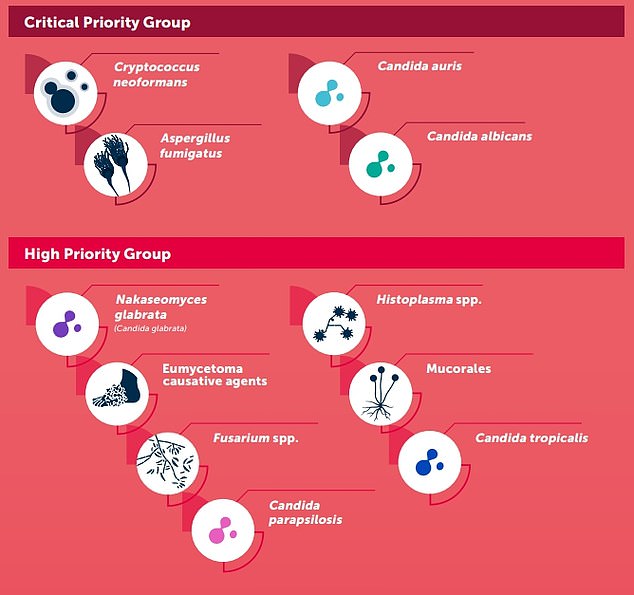Health officials have issued an urgent warning over a deadly drug-resistant fungal infection sweeping through hospitals in Europe.
Candidozyma auris (C.auris)—previously described by the World Health Organisation (WHO) as ‘a serious threat to humanity’—is spreading rapidly through hospitals and becoming resistant to the handful of existing antifungal drugs.
More than 4,000 people were infected with the fungus in Europe between 2013-2023, the European Centre of Disease (ECDC) declared in a new report released yesterday.
In 2023 alone some 1,346 cases were reported, reflecting a 67 per cent increase on the previous year.
Nearly 60 per cent of people who contract the nasty infection die within 90 days.
‘Case numbers are rising, outbreaks are growing in scale, and several countries report ongoing local transmission,’ the ECDC said.
The fungal infection usually spreads in healthcare facilities and hospitals and typically affects critically ill patients.
C.auris can cause serious infections in the blood, brain, spinal cord, bones and ears, as well as in the respiratory system and urinary tract.

C.auris, previously known as Candida auris, can cause serious infections in the blood, brain and respiratory system
Your browser does not support iframes.
The fungus, which can survive on hospital surfaces and the skin for long periods of time, has become resistant to most medicines that work against it, making it extremely difficult to treat.
Sampling across hospitals in Britain has found traces of the entity on medical equipment, as we all as radiators, windowsills and sinks—making them a hotspot for infection.
At least 18 countries have recorded cases in the last decade, with Spain, Greece, Italy, Romania and Germany accounting for the highest number of infections.
Recent outbreaks have also been reported in hospitals in Cyprus and France.
In 2016, following the first outbreak of C.auris in a hospital in Spain, the Royal Brompton Hospital in London was forced to close its intensive care unit after three patients died from the infection. A further 50 patients were infected.
Experts say the surge in cases is most likely the result of inadequate surveillance systems meaning it can quickly establish itself in hospitals undetected, problems diagnosing infections quickly and rising temperatures—which provide optimum conditions for fungi to thrive.
Dr Diamantis Plachouras, head of antimicrobial resistance and healthcare-associated infections at the ECDC, said: ‘C.auris has spread within only a few years—from isolated cases to becoming widespread in some countries.
‘But this is not inevitable. Early detection and rapid, coordinated infection control can still prevent further transmission.’

Four types of fungi were included in the World Health Organization’s critical priority group: Aspergillus fumigatus, Candida albicans, Cryptococcus neoformans and Candida Auris

C.auris is so deadly that the World Health Organisation has identified it as one of 19 lethal fungi that pose a ‘serious threat to humanity’
The nasty bug was first identified in 2009 in the ear of a Japanese patient and has since spread across more than 40 countries over six continents.
For years, fungal infections have been treated with a small number of antifungal drugs, but research shows most are becoming increasingly resistant—a trend driven by overuse, particularly in countries where treatments can be bought over-the-counter.
The spread of ‘superbugs’—pathogens that have developed resistance to the handful of drugs used to treat them—is an urgent health crisis deemed a ‘critical priority’ by the ECDC.
By 2050, it’s estimated that 10million people will die every year as a result of resistant infections.
Fungal infections are a particular concern because it has become increasingly difficult to develop new antifungal medicines—because the cells are remarkably similar to human cells.
As such, only four new antifungal drugs have been approved by regulatory authorities in the last ten years.
In the UK, all cases of C.auris must now be reported to health authorities in a bid to stop further outbreaks before they take hold.
